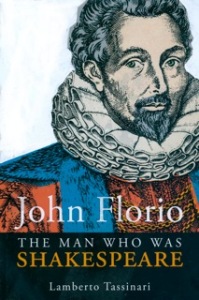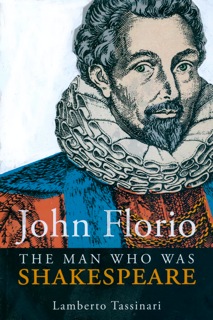 Lamberto Tassinari www.johnflorio-is-shakespeare.com
Lamberto Tassinari www.johnflorio-is-shakespeare.com
You asked me recently why I maintain that I am afraid of you. As usual, I was unable to think of any answer to your question, partly for the very reason that I am afraid of you, and partly because an explanation of the grounds for this fear would mean going into far more details than I could even approximately keep in mind while talking. Franz
OPEN LETTER
Dear professor Greenblatt, Yes, this is the incipit of Kafka’s letter to his father. Why do I quote here this powerful, cruel confession? Because my little letter too is about authority, power, fear and love of art. You are the indisputable authority of the Shakespearean studies and ipso facto, the keystone of the grand, albeit crumbling Stratfordian edifice. Thirty years ago, when the majority of English literature teachers in schools and universities were traditionally dealing with the romantic image of the isolated, universal genius, you started, to paraphrase the title of Duff Cooper’s book, a “saving sergeant Shakespeare” campaign, a literary operation aimed to sustain the Stratfordian identity of Shakespeare which was in peril. Within a few years, with the contribution of a handful of scholars, you dramatically reshaped the Shakespearean aura in order to save the identity of the author. Your strategy consisted essentially in imagining and portraying the “real” world in which Shakespeare, the mystery man, lived and wrote. A diminished Bard emerged from this operation, an almost surreal author candidly described by the critic Harold Bloom in the following terms … it is as though the creator of scores of major characters and hundreds of frequently vivid minor figures wasted no imaginative energy in inventing a persona for himself. (…) At the very center of the Canon is the least self- conscious and least aggressive of all the major writers we have known With the new Shakespeare, everything important and meaningful had to be newly imagined, and you were fantastic at that as your 2004 best seller biography Will in the World. How Shakespeare became Shakespeare shows. As a kind of postmodern Fernand Braudel, you knead the history of the English Renaissance you master perfectly with an extraordinary intimate knowledge of Shakespeare’s works, then transplant the anemic man from Stratford within that historical- literary compound, shamelessly using the glue of the numerous may well’s, could have’s, perhaps’, no doubt’s, evidently’s and likely’s. To perfect your revisionist labour you craftily called your product, Will instead of the canonical William. Such a familiarity with an author considered until recently a god, helped seduce your readers and the media, convincing almost everyone that you had brought to life the real Shakespeare. Thanks to some subtle manipulations, and mainly omissions, the Bard became the impure, plagiarist, collaborative playwright we now know: a perfect, postmodern Shakespeare for the twenty-first century. Soon though you realized that the downsizing wasn’t sufficiently safe. Indeed, your 2004 Will in The World has several flaws, the more serious and inexcusable is your total lack of consideration of Montaigne’s influence on Shakespeare. Obviously you were aware of Montaigne’s fundamental contribution to modernity and to Shakespeare’s works, but you refused to acknowledge his importance. I strongly believe you did so because admitting the French philosopher’s influence on the plays, would have been too risky a concession for the already shaky Stratfordian mythology. Therefore you decided to name Montaigne only once while referring, quick as a flash, to John Florio: Born in London, the son of Protestant refugees from Italy, Florio had already published several language manuals, along with a compendium of six thousand Italian proverbs; he would go on to produce an important Italian-English dictionary and a vigorous translation, much used by Shakespeare, of Montaigne’s Essays. Florio became a friend of Ben Jonson, and there is evidence that already in the early 1590s he was a man highly familiar with the theater.(p.227) Which is a bold statement indeed for Florio albeit with no interpretive consequences on your theory. Of course, none of the thousands Shakespearean critics denounced your omission, not on account of respect or fear of you but because they wanted to avoid a dangerous, internecine war which could have jeopardized the object of your common study and careers. In the years following your biography, the Stratfordian mythology crisis worsened with more attacks from all sides: several books by Oxfordian scholars, the good scholarly reputation earned by Diana Price’s Shakespeare’s Unorthodox Biography, the Declaration of Reasonable Doubt about the identity of William Shakespeare, the movie Anonymous, just to mention the more significant blows. There was also, in 2008 and 2009, my book and my website on John Florio, pounding at the periphery of the Shakespearean universe. As your revisionist Shakespeare became a baroque, bizarre writer, an unsatisfactory Bard in the long run, you judged that a bolder sortie was inevitable and in April 2014 you dared to publish Shakespeare’s Montaigne, a dense anthology of John Florio’s translation of Montaigne’s Essays. So, you did jump from zero Montaigne in 2004 to a book on Florio’s Montaigne in 2014: a really dramatic veer! Why? I believe it was because the postmodern Shakespeare you created was insufficient to stem the growing doubts about Stratford. Omission is your key-tool: in your introduction to Shakespeare’s Montaigne, as well as in Peter Platt’s biographical note, there is no mention of the historical discussion on the Montaigne-Shakespeare rapport, just a hurried admission: “Scholars have seen Montaigne’s fingerprints on many other works by Shakespeare whether in the echoing of words or ideas” . Your readers are not aware that Montaigne’s influence on the bard has always been a conflicting issue amongst scholars. One more omission, particularly nasty, concerns a book traditionally “censured” by Shakespearean scholars, Shakspere’s (sic) Debt to Montaigne the fundamental 1925 book by George Coffin Taylor who demonstrated ninety years ago the extent and depth of Montaigne’s influence on Shakespeare! Your rapport to John Florio too is, unsurprising, ambiguous as you try to repress what, I suspect, is your persistent, hidden doubt that Florio is more than a translator… Of the Italian Jewish writer you say this: “Montaigne was Florio’s Montaigne. His essays, in their rich Elizabethan idiom and wildly inventive turns of phrase”; and “the brilliance of Florio’s achievement”; “[Florio’s] translation seemed to address English readers of Shakespeare’s time with unusual directness and intensity”; “Shakespeare is mining Florio’s Montaigne not simply for turns of phrase but for key concepts” but at the same time you maintain that “there was a huge gap between them” [Montaigne and Shakespeare]. Your mind swings over and over as you seem to conclude that there was no real need for Shakespeare to have read Montaigne because they are “two of the greatest writers of the Renaissance” and somehow telepathically connected, two twin souls! And again: “But if Montaigne and Shakespeare were diametrically opposites in these and other ways (…) nonetheless there is a whole world that they share.” Which is a quite ambiguous position. An ambiguity though which reflects Florio’s own ambivalence towards Montaigne. Florio’s Essays are an immense, open source for the playwright but Shakespeare’s diversions from Montaigne on many points are already contained in Florio’s translation. For instance, Florio’s “politico-religious bias appears from time to time (…) ‘les erreurs de Wyclef’ become ‘Wickliff’s opinions’ as Frances Yates pointed out in her 1934 biography. Shakespeare’s religious, political, cultural, psychological variations from Montaigne that you track down in King Lear, Hamlet, The Tempest and elsewhere belong to Florio’s Montaigne which in the opinion of many scholars is almost an original book rather than a mere translation. As for your collaborator Peter Platt, he calls John Florio: the extraordinary Florio. One fundamental question remains unanswered: which other dramatists of Shakespeare’s time were influenced so profoundly by Florio’s Montaigne? Isn’t it bizarre, that amongst all the Montaigne’s readers in Renaissance England, only the uneducated, untraveled, monolingual Shakespeare bore the marks of the French thinker’s influence? With John Florio as the true Shakespeare you don’t have to suppose, as you unbelievably do, that Shakespeare looking over Florio’s shoulders read Montaigne’s translation “well before the first printing” in 1603! Today the sudden landing of Montaigne on your desk, dramatically exposes your personal, private will! What could happen now, professor Greenblatt, should you unearth more of previously undetected or overlooked influences on Shakespeare? What would be the new face of Shakespeare if you would suddenly “discover”, for instance, that Giordano Bruno who spent two years with Florio at the French embassy, has a strong presence in Shakespeare’s work? In your biography Bruno, alike Montaigne, is mentioned only once. You don’t ignore that the strong influence of Giordano Bruno on Shakespeare is hardly a recent discovery. Actually it was demonstrated by a host of scholars, from the German Falkson and the French Bartholmess in 1846 throughout Tschischwitz, König, Carrière, to Sacerdoti and Gatti-Cox in the 1990s. And what about the powerful influence that all things Italian, language and culture, had on Shakespeare? Lastly, what do you think of the hypothesis advanced by Saul Frampton in 2013 – and recalled by Peter Platt – that John Florio was the editor of the First Folio ? The real purpose of your rushed anthology, I suppose, is to freeze Florio in the role of Shakespeare’s almost involuntary helper. But, remember, in doing so you are just delaying Florio’s revelation. Actually, thanks to your initiative John Florio, until now completely unknown by Shakespeare’s lovers, is exposed worldwide to your readers, becoming the most intriguing figure of the English Renaissance, the closest to Shakespeare! By igniting people’s curiosity you provoke new doubts about the Stratford man and in doing so hasten his vanishing. How long, professor Greenblatt, till you’ll give us a book on Shakespeare’s Bruno or, why not, on Shakespeare’s Florio?
Best regards,
Lamberto Tassinari

